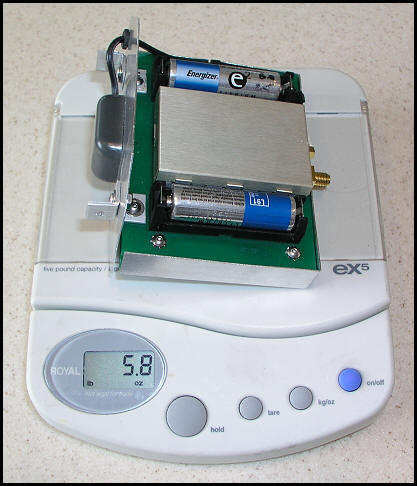|
|
Overview
Design Goal -
Create a high reliability, light weight APRS Tracking Beacon that can be used from mission to mission. The following are the
design goals of the Pico Beacon system.
 Extreme
Light Weight - Designed to be the lightest weight, complete tracking system.
The prototype met the initial 8 ounce design goal and weighs 5.8 ounces. Extreme
Light Weight - Designed to be the lightest weight, complete tracking system.
The prototype met the initial 8 ounce design goal and weighs 5.8 ounces.
 Operational
over full industrial temperature range (-40°C to° C). Designed for future, long
duration and over night missions. Initial night, flight test recorded
internal temperatures down to -48° C ° F). Operational
over full industrial temperature range (-40°C to° C). Designed for future, long
duration and over night missions. Initial night, flight test recorded
internal temperatures down to -48° C ° F).
 DDS
(Direct Digital Synthesizer) with digital modulation provides multi-waveform capability (1200bps
A-FSK and 9600bps FSK AX.25 APRS currently implemented). Future
expansion for experimental, low power Direct Sequence Spread Spectrum, Q-PSK, or
MFSK (OFDM) type waveforms. DDS
(Direct Digital Synthesizer) with digital modulation provides multi-waveform capability (1200bps
A-FSK and 9600bps FSK AX.25 APRS currently implemented). Future
expansion for experimental, low power Direct Sequence Spread Spectrum, Q-PSK, or
MFSK (OFDM) type waveforms.
 ½
watt (+27dBm) output power, controllable down to 50mW (+17dBm) ½
watt (+27dBm) output power, controllable down to 50mW (+17dBm)
 Frequency
agile over full UHF (420-450 MHz) 70cm band Frequency
agile over full UHF (420-450 MHz) 70cm band
 Accurate
carrier frequency +/- 10Hz over temperature (TCXO dynamically corrected with GPS 1-PPS) Accurate
carrier frequency +/- 10Hz over temperature (TCXO dynamically corrected with GPS 1-PPS)
 Industrial
Motorola M12+ GPS receiver as used for GM OnStar system. Industrial
Motorola M12+ GPS receiver as used for GM OnStar system.
 COTS
(Commercial Off The Shelf) batteries capable of operation at low
temperature with high power to weight ratio COTS
(Commercial Off The Shelf) batteries capable of operation at low
temperature with high power to weight ratio
 Flight
Data Recorder sampling at once per second Flight
Data Recorder sampling at once per second
 Capable
of full GPS tracking for 16 hours and 48 hours with managed GPS operation Capable
of full GPS tracking for 16 hours and 48 hours with managed GPS operation
 On
board software to predict landing location based on winds aloft data
gathered during ascent On
board software to predict landing location based on winds aloft data
gathered during ascent
 Temperature
sensor Temperature
sensor
 User
configurable through RS-232 port. Mission to mission configuration changes
do not require software load. User
configurable through RS-232 port. Mission to mission configuration changes
do not require software load.

Pico Beacon weigh in.
|





